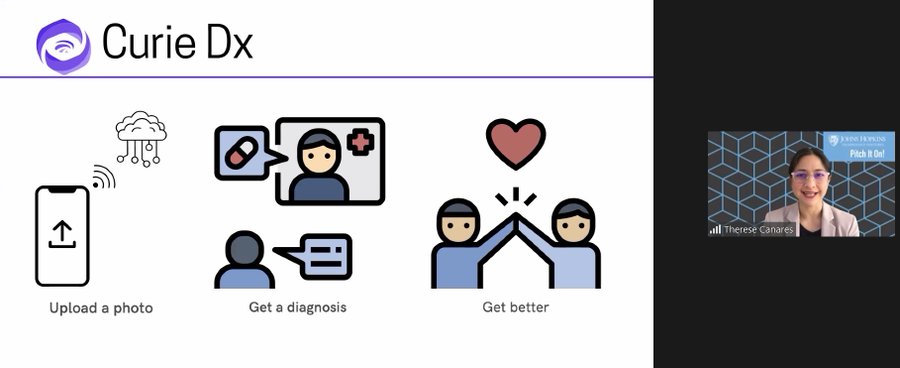
This editorial article is a part of Tech + Health Month of Technical.ly's editorial calendar. This month’s theme is underwritten by the Chesapeake Digital Health Exchange. This story was independently reported and not reviewed by CDHX before publication.
When it came time to name her AI-driven medical diagnosis platform, Dr. Therese Canares’ thoughts turned to Marie Curie.
The pioneering radioactivity scientist made discoveries that last through the ages. But she also stood out in her own time as a woman scientist.
“I was especially inspired by her story … that against all odds, in a very different era than we have today, that she was so successful with her innovation and discoveries, and bringing those to light,” said Canares, who is an assistant professor of pediatrics at the Johns Hopkins University School of Medicine and an emergency room physician.
With CurieDx, Canares is building on a research collaboration with Hopkins associate professor of computer science Mathias Unberath to develop a new innovation for the shifts toward telehealth. Its mobile technology uses AI and a phone’s camera to provide an “instant diagnosis” of common diseases.
They recognized a problem: “Emergency rooms are overused, that parents really experience the stress and burden of a sick child, and with our joint experience, we can create a solution to help patients and parents with this problem,” said Canares.
The platform us starting with strep throat, which currently has a test that requires an in-person visit and 15-minute test that studies say is 51% accurate. The goal is to make a virtual diagnosis of strep throat possible for telehealth providers.

Dr. Therese Canares (Courtesy photo)
“This would be a radical departure from what the standard of care is now,” she said.
Canares recently spotlighted this work and was awarded $10,000 on Oct. 19 as the winner of Johns Hopkins Tech Ventures’ Pitch it On Competition, which showcased women innovators from across the university community.
The competition was created in 2020 as part of a U.S. Small Business Adminstration-funded event series, called AccelHERator. Continuing into 2021, it is designed to showcase innovation, as well as serve as an inspiring and motivating event for women entrepreneurs from innovators across the spectrum. JHTV data states that 44% of faculty members at Johns Hopkins are female, but women account for only 11% of JHTV startups. They also only account for about a quarter of invention filings and somewhere between 20-30% of patents, said Liz Burger, senior director of strategic initiatives at JHTV.
“We believe that by not having those folks participate, we’re missing out on diverse ideas and perspectives that we think need to be brought forward,” Burger said. “The data is either a problem or it’s not. For us, it’s a problem.”
Along with Canares, the event featured presentations from:
- Dr. Shamemma Sikder, an associate professor of opthamology. She created EyeLearn, a training platform to analyze surgical videos and give feedback.
- Jamie Spangler, an assistant professor of biomedical engineering, who is developing a cell-based platform for the discovery of antibodies to protect against certain proteins.
The event reflects that JHTV wants to ensure that there are resources for women inventors with the highest-impact ideas who want to develop them into new businesses.
“If there’s anything we can do to encourage them to step forward, we want to do that,” Burger said. As the first program of its kind at JHTV, she noted that it will “hopefully lead to other ideas and other forms of celebrations and encouragement.”
At Pitch it On, the audience stretched beyond JHTV. There were professionals in healthcare technology from beyond the university, and Canares said several connected with her to assist in opening doors going forward. Canares’ students and mentees were also at the event to support. Many are women, and she hoped they were among those who were inspired, as well.
“It was a really wonderful moment for them to hear this project and this pitch up on the big screen, and they get to see what a career path in innovation can look like,” she said.
The team is in build mode, and the $10,000 will provide a boost. Canares is setting out to talk to as many users as possible and is focused on making it as intuitive as possible for the user, so that as soon as they open the app, they know what to do, and that it is optimized for telehealth.
The CurieDx team is also seeking to ensure that it is designed for a diverse population. Algorithms can have implicit bias if they aren’t trained with a diverse set of data, so Canares is being intentional to build the image database to reflect diversity in race, age, sex and ability. As the team designs the the product it is also mindful of creating a tool that’s financially accessible to many. Similarly to Marie Curie, CurieDx is seeking not just to push innovation forward, but also break down barriers in science.
“We want this to be something everyone can access, and trained on everyone,” she said.
Join the conversation!
Find news, events, jobs and people who share your interests on Technical.ly's open community Slack

Baltimore daily roundup: Gen AI's software dev skills; UpSurge Tech Ecosystem Report; MD service year program

Baltimore daily roundup: Mayoral candidates talk tech and biz; a guide to greentech vocabulary; a Dutch delegation's visit

Baltimore daily roundup: An HBCU innovation champion's journey; Sen. Sanders visits Morgan State; Humane Ai review debate


